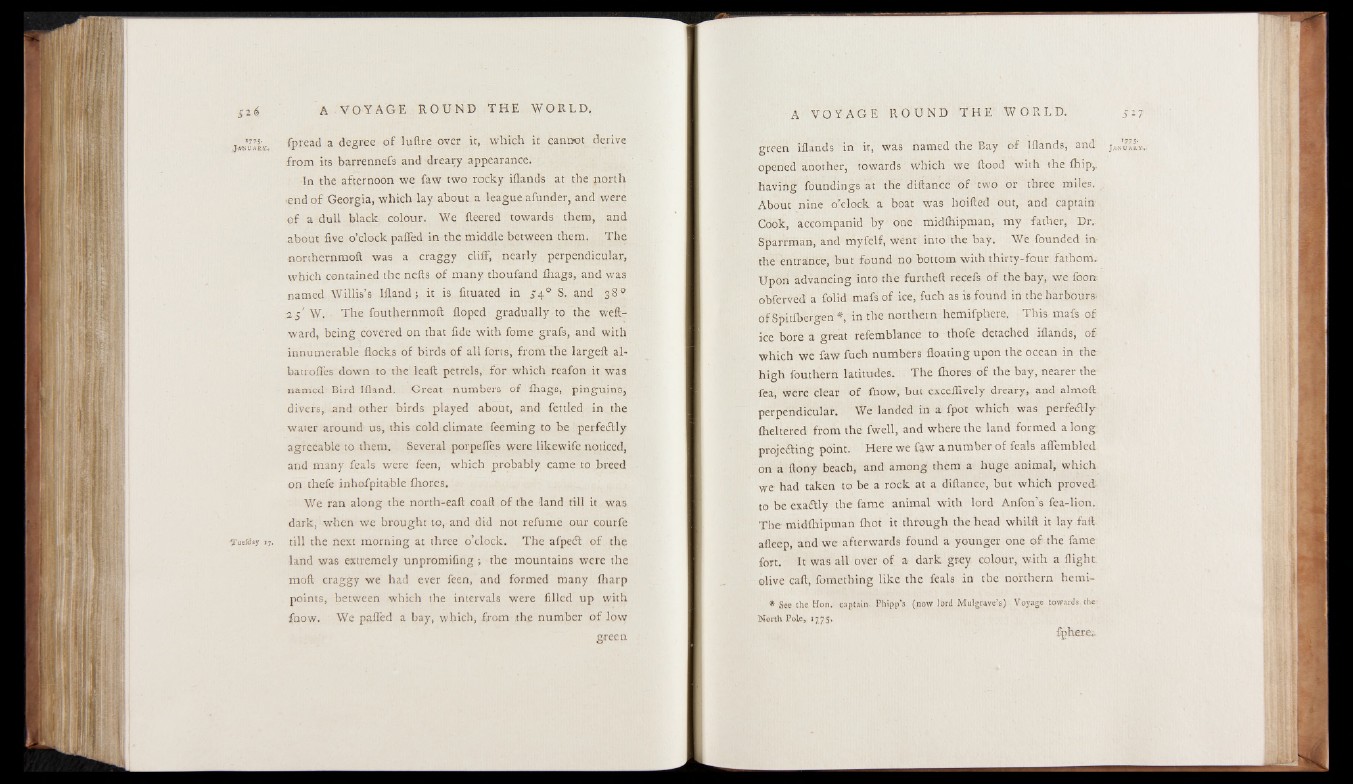
*775-
JANUARY.
'S'uefday 17,
fpread a degree of luftre over it, which it cannot derive
from its barrennefs and dreamy appearance.
In the afternoon we faw two rocky iflands at the north
-end of Georgia, which lay about a league afunder, and were
of a dull black colour. We fleered towards them, and
about five o’clock palled in the middle between them. The
northernmoft was a craggy cliff, nearly perpendicular,
which contained the nefts of many thoufand fhags, and was
named Willis’s Illand; it is fituated in 54° S. and 38°
2 5' W. The fouthernmoft Hoped gradually to the weft-
ward, being covered on that fide with fome grafs, and with
innumerable flocks of birds of all forts, from the largeft al-
batrofles down to the leaft petrels, for which reafon it was
named Bird Illand. Great numbers of fhags, pinguins,
divers, and other birds played about, and fettled in the
water around us, this cold climate feeming to be perfectly
agreeable to them. Several porpefles were likewife noticed,
and many feals were feen, which probably came to breed
on thefe inhofpitahle fhores.
We ran along the north-eaft coaft of the land till it was
dark, when we brought to, and did not refume our courfe
till the next morning at three o’clock. The afpedt of the
land was extremely unpromifing ; the mountains were the
moft craggy we had ever feen, and formed many lharp
points, between which the intervals were filled up with
fiiow. We pafled a bay, which, from the number of low
green
green iflands in it, was named the Bay of Iflands, and
opened another, towards which we flood with the Ihip,.
having foundings at the diftance of two or three miles.
About nine o’clock a boat was hoifted out, and captain
Cook, accompanid by one midlhipman, my father, Dr.-
Sparrman, and myfelf, went into the bay. We founded in
the entrance, but found no bottom with thirty-four fathom.
Upon advancing into the furtheft recefs of the bay, we foon.
obferved a folid mafs of ice, fuch as is found in the harbours,
of Spitlbergen *, in the northern hemifphere. This mafs of
ice bore a great refemblance to thofe detached iflands, of
which we faw fuch numbers floating upon the ocean in the:
high fouthern latitudes. The fhores of the bay, nearer the
fea, were clear of fnow, but exceflively dreary, and almoft
perpendicular. We landed in a fpot which was perfedUy
Iheltered from the fwell, and where the land formed a long;
projedting point. Here we faw a number of feals afiembled
on a flony beach, and among them a huge animal, which
we had taken to be a rock at a diftance, but which proved
to be exadlly the fame animal with lord Anfon’ s fea-lion.
The midlhipman Ihot it through the head whilft it lay fall
afleep, and we afterwards found a younger one o f the fame
fort. It was all over of a dark grey colour, with a flight,
olive call, fomething like the feals in the northern hetni-
* See the Hon. captain. Phipp’s (now lord Mulgrave’s) Voyage towards, the
North. Pole, 17,75.
fphere..